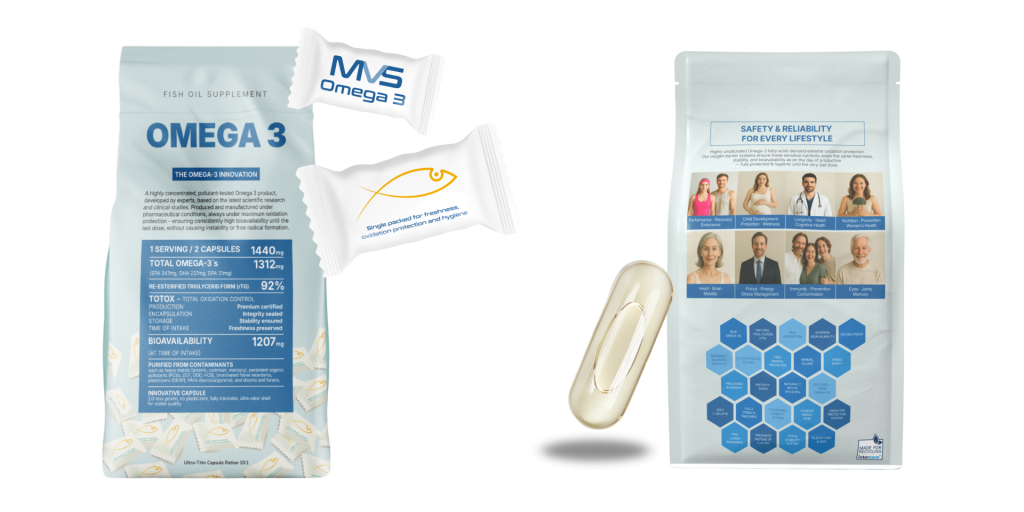Table of Contents
Omega-3 Index Research 2025: Introduction
The Omega-3 Index (O3i) — the % of EPA + DHA in red blood cell membranes — is a practical marker of long-term omega-3 status. A target O3i ≥8% is associated with lower cardiovascular risk, and raising O3i reliably usually requires ≥1,000 mg/day of EPA+DHA for ~12 weeks, preferably in triglyceride (TAG/rTG) form rather than ethyl esters. Many people don’t reach adequate intake through diet alone, even with regular fish consumption.
Why the Omega-3 Index Matters
The Omega-3 Index (O3i) measures EPA + DHA as a percentage of total fatty acids in red blood cell (RBC) membranes, reflecting intake over the past ~3–4 months. A higher O3i (≈8% or above) has been linked to lower risk of chronic disease, most notably cardiovascular disease, and is increasingly used to personalize dosing and track response.
- Key 2023 review: Dempsey et al. synthesized 58 trials and concluded that O3i is responsive to diet and supplements, and that practical recommendations can be made from available trials.
- Historically, the ≥8% target was proposed by Harris & von Schacky and remains a widely cited benchmark in contemporary reviews.
Intake Gap: Diet Alone Often Isn’t Enough
Major organizations (e.g., AHA) recommend eating fish twice per week (≈250 mg/day EPA+DHA), yet population data show most people consume well below this level.
- In Dempsey et al. (2023), many individuals — even regular fish eaters — failed to achieve an optimal O3i without supplementation.
- A 2023 Frontiers review on sardines reiterates that typical O3i in cohorts hovers around ~6% and >8% appears protective for CHD mortality.
ALA vs. EPA/DHA: Why Form Matters
ALA (from flax, chia, walnuts) has limited conversion to EPA and especially DHA in humans — typically <8–12% to EPA and <1–4% to DHA, with notable variability by sex and life stage. That’s why direct EPA/DHA intake is the most reliable way to elevate O3i.
Dempsey et al. specifically note that ALA/SDA have negligible effects on DHA and minimal impact on the O3i, while DHA is efficiently incorporated into RBC membranes, increasing O3i more effectively per mg than other n-3 FAs.
-
Key findings from the omega-3 research indicate:
1. ALA, found in plant-based sources, has limited conversion to EPA and DHA.
2. Only individuals consuming fish regularly and supplementing with >1,000 mg/day of EPA and DHA consistently maintained an optimal O3i.
3. EPA and DHA in triglyceride (TAG) or re-esterified triglyceride (rTAG) forms are more effectively absorbed compared to ethyl ester (EE) forms.
How Much Do You Need to Raise the Omega-3 Index?
From the 2023 Frontiers scoping review and PubMed abstract details:
- Dose & Duration: “Generally, the lowest doses shown to be effective in raising O3i to recommended levels were >1,000 mg/day of EPA + DHA for ≥12 weeks.”
- Chemical Form: “Supplements composed of triglycerides were more bioavailable and thus more effective than other formulas.” Practical guidance suggested 1,000–1,500 mg/day EPA+DHA as triglycerides for ≥12 weeks to approach ≥8% O3i.
A 2025 Frontiers RCT also showed EPA-rich and DHA-rich oils both raise O3i over 6 weeks versus placebo.
1. Test & target: If possible, measure your O3i and aim for ≥8% over time.
2. Dose smartly: ≥1,000 mg/day EPA + DHA for ~12 weeks is a reasonable starting point to move O3i upward; adjust with re-testing.
3. Choose form wisely: Prefer rTG/TAG over EE for better absorption and O3i response.
4. Diet still matters: Keep fatty fish twice weekly as a base; supplements fill gaps.
5. Consider DHA leverage: DHA is incorporated into RBC membranes more efficiently per mg and can be potent for lifting O3i.
Bioavailability: rTG/TAG vs. Ethyl Esters (EE)
Chemical form significantly affects absorption and tissue incorporation:
- Re-esterified triglyceride (rTG/TAG) forms are consistently more bioavailable than ethyl esters (EE) in human kinetic and incorporation studies.
- Contemporary pharmaco-kinetic reviews (2025) also emphasize higher bioavailability from TAG/rTG compared with EE across acute and chronic settings.
What it means: If your goal is to raise O3i efficiently, choose rTG/TAG oils and ensure sufficient dosing and duration. - Safety & Nuance: Recent Population Data Show large observational data (UK Biobank, BMJ Medicine 2024) found mixed signals: in people without CVD, regular fish-oil use was associated with higher AFib and stroke risk, whereas in people with CVD, use was associated with lower progression to MI and lower mortality. This underscores the need for personalized advice and product quality; the study did not capture formulation, dose, or oxidation status. (Observational ≠ causation.)
MVS Pharma’s Innovation: Translating Evidence into Formulation
At MVS Pharma, we applied these key research insights into the formulation of our MVS Omega-3 supplement, ensuring maximum bioavailability, stability, and efficacy. It is our mission to address the critical shortcomings of today’s Omega-3 supplements by developing a solution that meets the highest standards of purity, freshness, and absorption.

- Oxidation Resistant: Freshness maintained from first capsule to last — proven by strict TOTOX control.
- Highest purity → Our omega-3 oil is manufactured in accordance with strict standards and with pharmaceutical-grade-like care, purified using a sophisticated process.
- Superior absorption: We use an advanced re-esterified triglyceride (rTG) form, which, like in the trials, shows better bioavailability than EE.
- Clean & safe: Free from heavy metals, PCBs, microplastics.
- Sustainability: Responsibly sourced small fish, fully traceable.
- German manufacturing: GMP & ISO-certified conditions.
- Double protection packaging: Each capsule is sealed individually, then stored inside protective pouches for unmatched stability.
MVS Omega-3 sets a new benchmark in supplement quality — no shortcuts, no compromises.
Conclusion: The Future of Omega-3 Supplementation
The omega-3 index remains a vital marker for cardiovascular and overall health. Since most individuals struggle to meet their omega-3 needs through diet alone, high-quality supplementation is essential. By incorporating the latest scientific insights, the MVS Omega-3 supplement offers a superior solution for achieving and maintaining an optimal omega-3 index.
FAQs
-
What is the Omega-3 Index and why is it important?
The Omega-3 Index (O3i) measures the percentage of EPA and DHA in red blood cell membranes, reflecting your long-term omega-3 status. A level of 8% or higher is linked with better cardiovascular, cognitive, and inflammatory health, while low levels (<4%) indicate an increased risk of heart disease and systemic inflammation.
-
How much Omega-3 do I need to reach an optimal Omega-3 Index?
Before starting any supplementation, it’s best to measure your current Omega-3 Index (O3i) through a simple blood test performed by your doctor or cardiovascular health professional. This test reveals your baseline omega-3 status and helps determine whether lifestyle adjustments or supplementation are needed.
If your O3i is below the optimal 8% threshold, your healthcare provider may recommend increasing intake through diet or using a high-quality Omega-3 supplement in a bioavailable rTG form to help you reach and maintain ideal levels safely.
-
Can I reach a healthy Omega-3 Index through diet alone?
Usually not. Even people who eat fish several times a week often fail to reach the 8 % threshold. Modern diets provide only about half the recommended intake (≈250 mg/day) of EPA + DHA, so supplementation is often necessary to achieve clinically beneficial omega-3 levels.
-
What is the difference between rTG/TAG and ethyl-ester (EE) Omega-3 supplements?
The re-esterified triglyceride (rTG/TAG) form mirrors the natural structure of omega-3s in fish and is significantly more bioavailable than the ethyl-ester (EE) form. Studies confirm that rTG/TAG omega-3s are absorbed more efficiently and raise the Omega-3 Index faster and more reliably.
-
Does DHA or EPA matter more for raising the Omega-3 Index?
Both are vital, but DHA is incorporated into red blood cell membranes more efficiently per milligram, making it particularly effective for elevating O3i. For best results, choose supplements that provide a balanced ratio of EPA and DHA in bioavailable rTG form.
-
How long does it take to see an improvement in my Omega-3 Index?
Clinical trials show measurable increases in O3i after 8–12 weeks of consistent supplementation, depending on dose, baseline levels, and absorption efficiency. Re-testing after three months is the best way to confirm your progress and fine-tune your intake.
-
What makes MVS Omega-3 an ideal choice for maintaining a healthy Omega-3 Index?
MVS Omega-3 is formulated in the high-absorption rTG form, with 92 % active omega-3, oxidation protected, and argon-sealed, double-layer packaging to guarantee freshness and stability. Manufactured under GMP and ISO standards in Germany, it delivers the purity, bioavailability, and consistency required to help you reach and sustain an optimal Omega-3 Index.
Sources/References:
- Dempsey M, Rockwell MS, and Wentz LM (2023). The Influence of Dietary and Supplemental Omega-3 Fatty Acids on the Omega-3 Index: A Scoping Review. Frontiers in Nutrition. DOI: 10.3389/fnut.2023.1072653.
- Frontiers: The influence of dietary and supplemental omega-3 fatty acids on the omega-3 index: A scoping review
- American Heart Association: Fish and Omega-3 Fatty Acids
- National Library of Medicine: Comparative membrane incorporation of omega-3 fish oil triglyceride preparations differing by degree of re-esterification: A sixteen-week randomized intervention trial
- PubMed: The influence of dietary and supplemental omega-3 fatty acids on the omega-3 index: A scoping review


